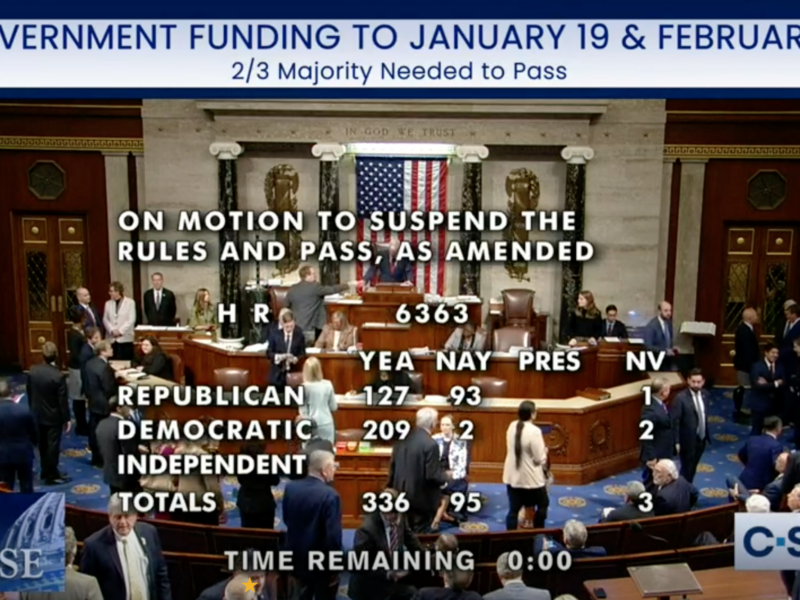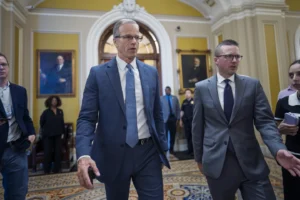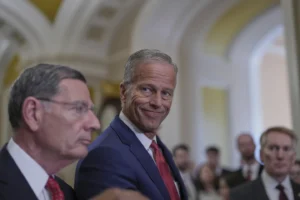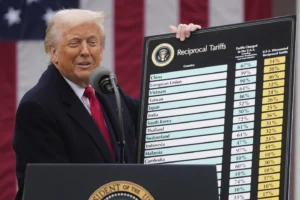Amid High Tensions, House Extends Government Funding Through Early 2024
Wyoming Rep. Hageman opposed the measure; Sens. Lummis, Barrasso poised to support it
- Published In: Politics
- Last Updated: Nov 15, 2023

The U.S. House approved a measure to temporarily extend government funding through early 2024, over the objection of Rep. Harriet Hageman (R-Wyo.). (Photo via C-SPAN)
By Jacob Gardenswartz
Special to the Wyoming Truth
WASHINGTON —The U.S. House on Tuesday approved an unusual plan to temporarily extend government funding and avert an impending shutdown by setting up two funding deadlines early next year, the latest development in an ongoing saga over federal appropriations that has roiled the Congress for several months and shows no signs of easing anytime soon.
The final vote tally was 336-95, and the bill passed with more support from Democrats than Republicans. Senate leaders said they intend to take up the measure imminently, and President Joe Biden is expected to sign it well before the funding deadline at midnight on Friday.
Rep. Harriet Hageman (R-Wyo.) opposed the bill, writing in a post-vote statement that “we cannot continue to do business as usual in Washington and expect different results for the American people.”
“This short-term bill continues spending at current, grossly inflated, levels that were based on COVID-19 spending,” Hageman continued. “We should be insisting that the Senate take up these bills, pass them, or counter them. We should not be simply delaying the process to January and February.”
Many conservative lawmakers expressed frustration with newly-empowered House Speaker Mike Johnson (R-La.) for pursuing a so-called “clean” funding extension without any cuts to social programs or border enforcement additions. Rep. Chip Roy (R-Texas) told reporters Monday it was the “wrong approach,” and the far-right House Freedom Caucus also came out against it.
But Johnson defended his approach in a news conference Tuesday morning, suggesting that while he was sympathetic to the conservative critiques, his hands were tied.
“When you have a three vote majority, as we do right now, we don’t have the votes to be able to answer that right now,” Johnson said. “So what we need to do is avoid the government shutdown.”

He repeatedly praised the two-step deadline as an “important innovation,” suggesting it “allows us, as conservatives, to go into the fight on the next stages of this” while avoiding a trillion-dollar holiday omnibus package — something that has become routine in recent years.
What’s this about a ‘ladder?’
Johnson’s self-described “innovation” comes by creating multiple deadlines for funding different parts of the government, rather than one cutoff date. In this way, lawmakers have time to debate and hopefully pass bills impacting different agencies — thereby building the rungs of the ladder — until the whole government is funded.
In reality, the plan functions more like a step-stool: should the measure pass the Senate, funding for the Departments of Agriculture, Transportation, Housing and Urban Development and Veterans Affairs would be extended through Jan. 19. Funds for the Defense Department and remaining agencies would run through Feb. 2.
Democrats initially panned the idea, and the White House Press Secretary labeled it “extreme.” But as it became clear it contained none of the feared cuts to social services, Democrats’ opposition thawed.
“I certainly don’t agree with everything [Johnson’s] proposing,” Senate Majority Leader Chuck Schumer (D-N.Y.) told reporters Tuesday. “But the proposal before the House does two things Democrats pushed for… one, not making the hard-right cuts that the MAGA wing demands. And second, making sure that if they’re going to do this sort of goofy ladder, that Defense is in the second part of the ladder, not the first.”
House Democratic leaders did not whip in favor of the bill, but they didn’t urge their members to oppose it. Ultimately, 93 Republicans voted against the bill, joined by only two Democrats.
“[W]e will always put people over politics and try to find common ground with our Republican colleagues wherever possible, while pushing back against Republican extremism whenever necessary,” House Democratic leadership said in a joint statement ahead of the final vote.
What next?
The bill now heads to the Senate, where Schumer has promised the chamber will take it up “as soon as possible.”
Minority Leader Mitch McConnell (R-Ky.) said Tuesday he believed the measure was a “step in the right direction” and intends to support it.
Sen. Cynthia Lummis (R-Wyo.), among the loudest voices advocating for cutting government spending, also voiced support, urging her House GOP colleagues to back Johnson’s bill earlier this week.
And though Sen. John Barrasso (R-Wyo.) has not outlined his position publicly, he is expected to support it as well given his close ties to Senate GOP leadership.
While the measure extends funding through mid-January and early-February, it is still unclear whether lawmakers will reach an agreement to fund the government beyond that.
Johnson projected confidence they would: “I can’t turn an aircraft carrier overnight,” he said. “But this was a very important first step to get us to the next stage, so that we can change how Washington works.”
But McConnell was less firm in his optimism: “Well we hope so,” he responded when asked whether the Congress could clear all 12 appropriations bills before the deadlines.
Tensions on high
As funding debates persist, tensions in the Capitol have reached a highpoint. At least twice on Tuesday, lawmakers appeared close to engaging in physical fights.
In the House, former Speaker Kevin McCarthy (R-Calif.) was accused of elbowing Rep. Tim Burchett (R-Tenn.) in the kidney; Burchett was among the eight Republicans who voted to oust the former GOP leader last month, and McCarthy has not been shy in voicing his distaste for the group.
“I got elbowed in the back, and it kind of caught me off guard because it was a clean shot to the kidneys,” Burchett told CNN.
McCarthy denied engaging in any violence, suggesting to reporters that it’s “a tight hallway” and adding that, “If I’d kidney punched him, he’d be on the ground.”
In the Senate, a fistfight nearly broke out during a committee hearing on labor unions in America. Sen. Markwayne Mullin (R-Okla.), a former MMA fighter, recalled an online interaction he previously had with the president of the Teamsters union, Sean O’Brien, in which they discussed engaging in a cage fight for charity after verbally sparring in a previous hearing.
Referencing their past exchange, Mullin said Tuesday: “Sir, this is a time; this is a place. You want to run your mouth? We can be two consenting adults. We can finish it here.”
They continued aggressive verbal jabs before Mullin rose to his feet and appeared to lean towards O’Brien, only to be talked down by Sen. Bernie Sanders (I-Vt.).
Asked about the high tensions later that afternoon, McConnell demurred.
“It’s difficult to control the behavior of everybody who’s in the building,” he said. “I don’t view that as my responsibility. That’s something that the Capitol Police have to deal with.”













